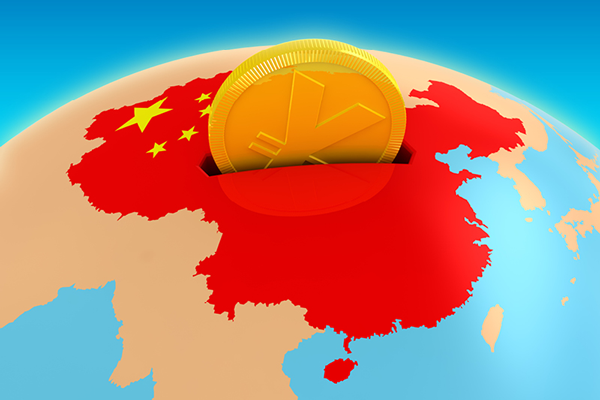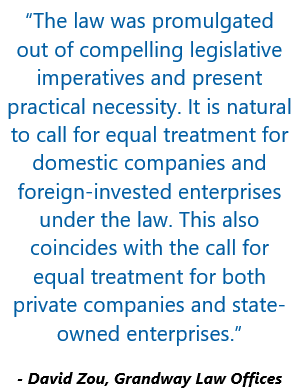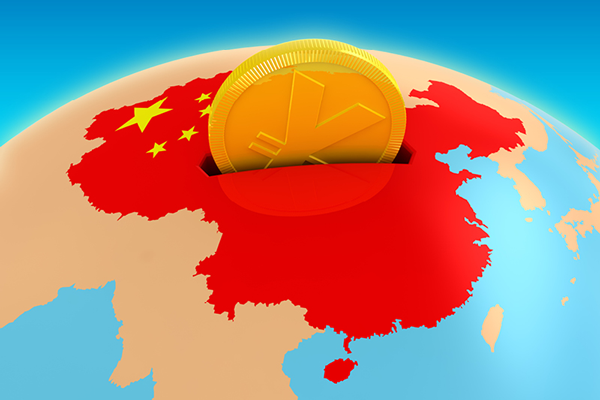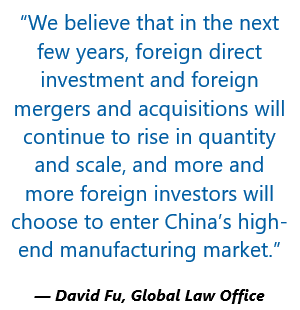
In a landmark move to further open the country to foreign investment, China promulgated a new foreign investment law on March 15. Taking effect in January next year, the new law aims to create a unified set of rules and a level playing field for both domestic and foreign enterprises while giving foreign players more protection.
The timing for the promulgation of China’s new foreign investment law couldn’t have been better. As China is still trying to resolve trade disputes with the U.S., the new law is widely seen as the country’s effort to address the concerns raised by the U.S.
The first draft of the foreign investment law was tabled in 2015, but the trade spat that started last year prompted the authorities to overhaul the draft last December, and to make it into law faster.
“A different version of the foreign investment law signifies China’s message to the world that it is open for business and welcoming foreign investment,” says Howard Wu, chief representative of Baker McKenzie’s Shanghai office.
UNDER PRESSURE
The new draft is believed to be especially tailored to address the concerns raised by the U.S. in the ongoing trade talks. The U.S. has played a vital role in pressuring China to roll out the new law much faster than expected, says David Fu, partner at Global Law Office.
 In March 2018, the U.S. announced a large-scale tariff increase on goods imported from China and said the country forced foreign companies to transfer their technology by using unfair policies, among other accusations.
In March 2018, the U.S. announced a large-scale tariff increase on goods imported from China and said the country forced foreign companies to transfer their technology by using unfair policies, among other accusations.
“From the content of the foreign investment law, it responds to and clearly stipulates some sensitive issues, such as market access, intellectual property protection and technology transfer, in the bilateral negotiations caused by the U.S.-China trade war,” Fu says.
For example, the issue of technology transfer was not mentioned in the previous draft, but now it is stipulated clearly.
“Article 22 specifically stipulates that the State encourages technical cooperation on the basis of free will and business rules in the process of foreign investment. Technical cooperation conditions shall be determined under the principle of fairness by all investment parties upon mutual negotiation, and no administrative organ or any functionary thereof may force the transfer of any technology by administrative means,” Fu explains.
He believes that law new could enhance the confidence of foreign investors in the long term, and improve the international image of China’s legal protection for foreign investors.
Meanwhile, the new law is also a response to the long-term call by the international business community for equal treatment in China, as foreigners face a separate set of rules when doing business there.
Various laws and regulations relating to Chinese-foreign equity and cooperative joint ventures, as well as wholly foreign-owned enterprises, were promulgated prior to the Company Law. This resulted in parallel legal structures for domestic companies and foreign-invested enterprises, which led to much confusion and unequal treatment, according to David Zou, partner at Grandway Law Offices (Shanghai).
The Chinese authorities knew that they had to enhance the overall foreign investment environment and set a level playing field for both sides.
“The law was promulgated out of compelling legislative imperatives and present practical necessity,” says Zou. “It is natural to call for equal treatment for domestic companies and foreign-invested enterprises under the law. This also coincides with the call for equal treatment for both private companies and state-owned enterprises.”
Internal needs are also catalysts: The Asian economic giant is expanding domestic demand and encouraging foreign capital inflows, so it urgently needs to reform its existing foreign investment regulatory regime, simplify the foreign investment approval process, and enhance the confidence of foreign investors.
FRAMEWORK FOR EQUALITY
The new foreign investment law repeals and replaces the Sino-Foreign Equity Joint Venture Law, Sino-Foreign Cooperative Joint Venture Law and Wholly Foreign-Owned Enterprise Law as well as the original complex approval system that ran on a case-by-case basis, Fu explains. He adds that the new law unifies domestic and foreign investment regulations.
“The law establishes the overall regulatory framework for foreign direct investment and mergers and acquisitions by foreign investors, establishes a pre-establishment national treatment and Negative List system, and reiterates the requirements for anti-trust review and national security review of foreign investment,” says Fu.
He sees the new law as a critical part in building China’s foreign investment regulatory regime from a macro perspective.
In establishing the regulatory regime, treating domestic and foreign players equally is the main purpose of this new law, as is reflected by key provisions concerning pre-establishment national treatment, access to government procurement projects and similar processes.
The law grants foreign-investment enterprises national treatment in all aspects, Zou explains. The national treatment principle is embodied in many mechanisms, such as the right to participate in the process of setting standards, the right to equal access to government procurement processes, the right to issue stocks and bonds through public offerings, the right not to be expropriated or otherwise a fair process and compensation in the event of expropriation, the right to remit profit out of China, the right to equal protection of intellectual property, and the right to unbiased application processes for administrative licenses and permits.
Any foreign investment falling outside the Negative List is regulated in accordance with the principle of equal treatment of domestic and foreign investment.
“This is somewhat of a response to the feedback from foreign investors about the difficulties they’ve encountered in the market. Domestic players, especially state-owned companies, are usually perceived to have an advantage and foreign-invested companies are treated in a more stringent manner from a regulatory perspective,” says Baker McKenzie’s Wu.
SAFER AND FRIENDLIER
Another thing to note is that foreign investors are given more protection under the new law.
“The new law explicitly prohibits forced transfer of technology through administrative means, diminishing foreign investors’ lawful rights and benefits, increasing their obligations, and setting up market entry and exit obstacles,” Zou explains.
He adds that in case contracts or commitments are changed or terminated on grounds of national interest or public interest, the government is required to compensate affected parties.
The government authorities, which will be more service-oriented, will also strive to facilitate and promote investment, handle complaints from foreign-invested enterprises, make and implement more friendly policies that aim at attracting foreign investment into specific regions.
“For example, the Ministry of Commerce launched a platform called Foreign M&A Working Committee to facilitate foreign investment and acquisition in China by providing both online information on merger and acquisition projects and organising offline match-making activities,” Zou explains.
The new law also introduces a new governance structure for foreign-invested enterprises for better operation and management.
This has been done by abolishing the provisions that the board of directors is the highest authority of the Sino-foreign joint ventures. In compliance with the Company Law, the new law requires all existing foreign investment enterprises to establish a modern corporate governance structure of “Shareholders’ Meeting – Board of Directors – Managers” within a five-year grace period.
“By dismissing the board of directors as the highest authority, it can prevent the company from lacking a check and balance mechanism. The absolute power of the board of directors makes it difficult to prevent the losses caused by wrong decisions,” Fu explains.
The unification of regulations for domestic and foreign investment will help erase the dual-regulation system, and consequently lead to clearer management of the companies, he adds.
In addition, major matters will no longer require unanimous approval by the board of directors of a company, as stipulated in the three original laws, but approval by shareholders who represent more than two-thirds of the voting rights.
“This helps avoid corporate deadlock,” Fu says.
SHIFT IN FOCUS
The new law is poised to impact lawyers in foreign direct investment practices in many ways. With the country opening up further, Grandway’s Zou predicts more legal work in sectors previously restricted or prohibited to foreign investors, such as the financial service industries.
“More foreign financial players will tap into the Chinese market,” he says.
Legal professionals who will be in higher demand will include those specialised in administrative relief, government procurement, competition, unfair trade practices, intellectual property and commercial litigation, as well as those in M&A since more foreign investors will directly acquire Chinese companies to enter the market.
Meanwhile, given the mandatory change in corporate governance structures in five years’ time, Global Law Firm’s Fu says his focus will be on assisting foreign investors in making preparations for their joint ventures in China to manage timely negotiations with their Chinese partners, amend the existing joint venture contracts and Articles of Association, and submit filings to the competent authorities for approval on time.
“The negotiation of relevant amendments to joint venture contracts may cause the parties to the joint venture to renegotiate the corporate governance and other provisions of the joint venture contracts, and even cause disputes and litigation,” Fu adds.
As for the wholly foreign-owned enterprises, Fu and his team will assist foreign investors in reviewing the current Articles of Association of the company to determine whether any amendments are necessary to fully comply with mandatory regulations, such as corporate governance, under the Company Law.
“The restructuring of existing foreign-invested enterprises, including sales of assets or equity, merger and division, termination and liquidation, will become more active with the promulgation of the new law,” he notes.
 A LEAP FORWARD
A LEAP FORWARD
As an overall framework, the new foreign investment law will serve as the “constitution” for foreign investment in China, while clearing up many confusions and concerns for foreign investors.
After the rejuvenation of the whole regime governing foreign investment in China, Zou believes foreign investors will see a whole new foreign investment legal system that will extend equal market entry opportunities, offer equal protections and solve disputes more efficiently.
“This will be the most welcome gift for foreign investors seeking emerging opportunities, an even playing field, and equal protection,” he adds.
Baker McKenzie’s Wu also believes the new law helps change the impression that China is always picking sides.
“Since 2008, China has started to implement rules in an attempt to reshape a regulatory regime that is perceived and experienced as being more favourable towards domestic companies and more discriminatory and stringent towards foreign-invested companies. The new law in that sense is a large step in the right direction to achieve that goal,” he says.
Eventually, foreign investors will have more confidence in setting up joint ventures or wholly foreign-owned enterprises in China, the lawyers believe.
“We believe that in the next few years, foreign direct investment and foreign mergers and acquisitions will continue to rise in quantity and scale, and more and more foreign investors will choose to enter China's high-end manufacturing market,” says Fu.
Reuters Explainer: China changes laws in trade war with U.S., enforcement a concern
China has been changing laws to address U.S. concerns about fair treatment of foreign companies, but with some vague wording and persistent concerns about enforcement, it is unclear if this will leave Washington satisfied.
In a sharp deterioration in negotiations between the world’s two largest economies, top U.S. trade officials have said that China had backtracked on substantial commitments it made during trade talks with the U.S.
The concerns prompted U.S. President Donald Trump to say he would raise tariffs on $200 billion of Chinese goods imported into the U.S. However, trade talks are set to continue.
Washington has demanded China change its economic policies by changing its laws, to better protect U.S. intellectual property, end forced technology transfers from U.S. companies, and stop cybertheft of U.S. trade secrets.
DOES CHINA’S NEW FOREIGN INVESTMENT LAW MATTER?
In March, China fast-tracked legislation for its first foreign investment law, which comes into effect on Jan. 1, 2020.
Premier Li Keqiang pledged that the government would follow through and do what the legislation promised in protecting foreign firms.
The law would ban forced technology transfer and illegal government “interference” in foreign business practices, according to the latest draft.
Previous drafts stipulated criminal punishment for officials who violated the law and a last-minute revision has strengthened those clauses.
Foreign business groups have in principle welcomed the law, but the big concern is about enforcement, especially when the judicial system takes its orders from the ruling Communist Party.
One Beijing-based Western executive told Reuters the law was probably best viewed as a “PR exercise” to try and head off some U.S. accusations of unfair treatment for American companies that, in part, led to the trade war.
“It’s all smoke and mirrors,” the executive said, referring to whether the law will make a difference.
WHAT OTHER LAWS HAS CHINA CHANGED?
At a regular law-making session in April, parliament’s standing committee amended three existing laws to try to improve the business environment. These included strengthening trade secret protections, further measures to stop forced technology transfers and increases in the punishment of those who infringe trademarks.
“Bad faith” trademarks, or “trademark squatting”, where an entity registers a brand in anticipation of its entry into China, is a major irritant for foreign investors.
“We believe there needs to be more attention paid to this,” said Nicholas Holt, chairman of the British Chamber of Commerce in China.
“There need to be more efforts to clamp down on the bad faith trademarks.”
The changes to the Trademark Law take effect on Nov. 1, while amendments to the Administrative Licensing Law, and Law Against Unfair Competition have already come into force.
Getting proper licenses to operate in China has been a lengthy process fraught with uncertainty due to unspecified documentation demanded by various levels of government.
Requiring all administrative licensing criteria to be made public and holding Chinese officials accountable for violating laws have been welcomed by western businesses. But they say implementation would still vary across provinces and cities due to differing interpretations of the law.
WHY DOES WASHINGTON NOT TRUST CHINA TO FOLLOW THROUGH?
The Trump administration says China has repeatedly failed to follow through on pledges to implement reforms sought by the U.S.
Washington often cites as an example the difficulties still faced by foreign payment card operators in entering China’s market despite a 2012 World Trade Organization ruling that Beijing was discriminating against them.
Also, breeding mistrust was the failure of what would have been the world’s largest-ever semiconductor sector takeover last year in the thick of the Sino-U.S. trade war.
In July last year, China’s antitrust regulator quietly allowed a key approval deadline to lapse, leading to the collapse of Qualcomm Inc’s $44 billion planned takeover of NXP Semiconductors.
To contact the editorial team, please email ALBEditor@thomsonreuters.com.





